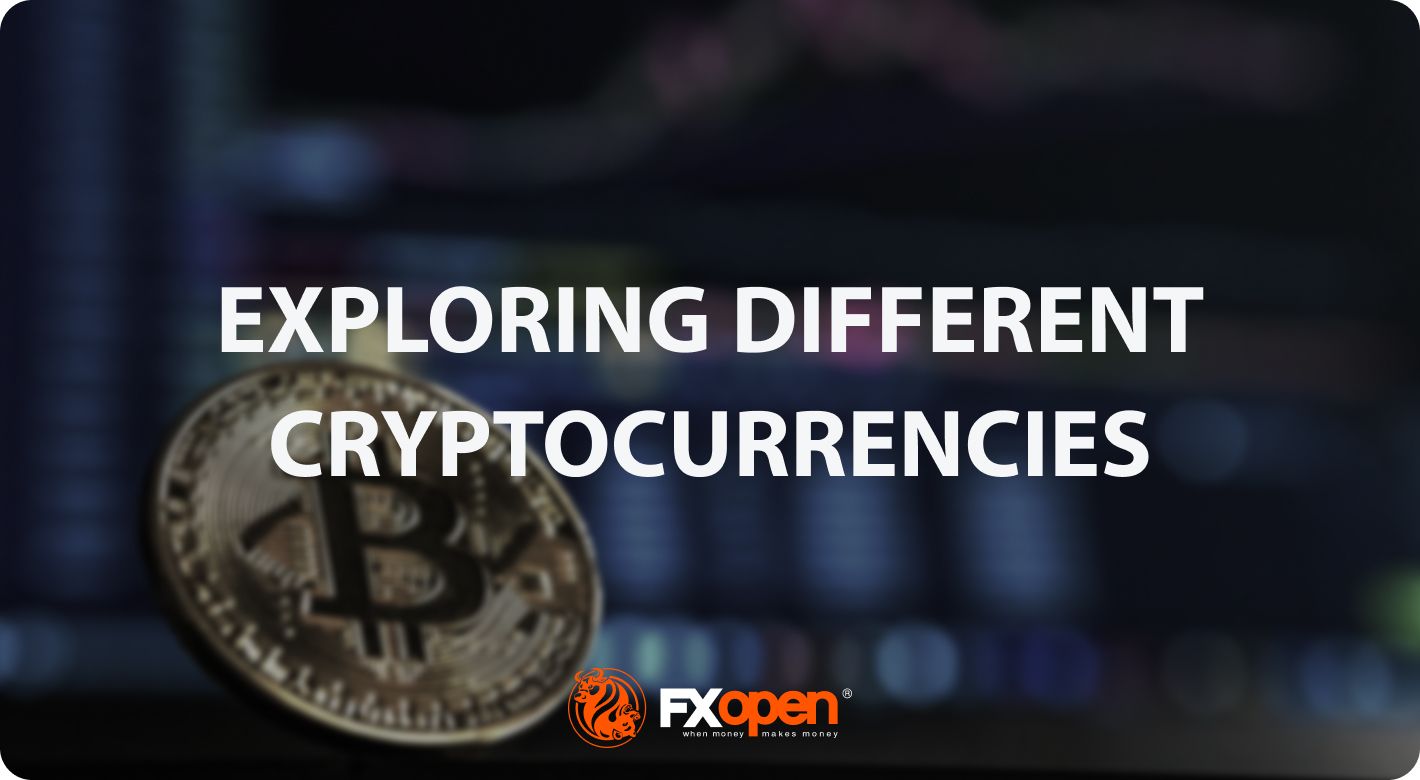FXOpen

Cryptocurrencies, once a niche tech curiosity, have exploded into influential financial instruments that have redefined the global economic landscape. This article dives into their foundational aspects, types, and significance, offering a comprehensive overview of the world of digital assets.
Definition and Characteristics of Cryptocurrencies
Cryptocurrencies are digital or virtual assets secured using cryptographic techniques. Unlike traditional currencies issued by governments, they operate on a decentralised system. Key features distinguish them from other assets:
- Decentralisation: No central authority controls or issues them.
- Transparency: All transactions are recorded on public ledgers.
- Immutability: Once recorded, data cannot be altered retroactively.
- Limited Supply: A limited supply encourages scarcity and potentially price appreciation.
- Diverse Usage: Beyond serving as a medium of exchange, they can also function as a store of value or a unit of account.
Overview of Blockchain Technology
Blockchain technology is the foundational system underpinning most cryptocurrencies. At its core, a blockchain is a distributed ledger comprising linked blocks, each containing a list of transaction records. Let’s break down its most basic elements:
- Blocks: These are information sets that store digital currency info, such as transaction data.
- Chain: It represents the sequential linking of blocks, which ensures the integrity of previous transaction records.
- Nodes: These are computers in a blockchain network that validate and record transactions, maintaining the ledger's accuracy and security.
- Decentralisation: Unlike centralised databases, multiple copies of a blockchain exist across various nodes, eliminating single points of failure.
- Transparency and Security: Due to its structure and cryptographic principles, blockchains provide unparalleled transparency while also ensuring that recorded transactions are tamper-resistant.
Types of Cryptocurrency
Cryptocurrencies come in various flavours, each with unique purposes and functionalities:
- Coins: The original digital currencies, like Bitcoin or Ethereum, that operate on their own blockchains.
- Altcoins: Short for "alternative coins," these are projects different from Bitcoin, often improving on it or introducing new features. For example, Ripple, Litecoin, or BNB.
- Tokens: Digital assets issued on existing blockchains like Ethereum or Solana. They are usually tokens that grant access to specific features or benefits.
- Utility Tokens: Tokens granting holders access to a project's product or service.
- Stablecoins: Cryptocurrencies pegged to traditional currencies, like the US dollar, aiming for price stability, e.g., USDC or Tether.
- Meme Coins: Digital assets, like Dogecoin and Shiba Inu, which started as internet jokes but gained real-world value and popularity.
Popular Cryptocurrencies and Their Use Cases
Bitcoin (BTC)
Often referred to as 'digital gold', Bitcoin primarily serves as a store of value and medium of exchange. Being the first cryptocurrency, its decentralised nature allows peer-to-peer transactions without intermediaries, making global payments seamless and relatively swift.
Ethereum (ETH)
Ethereum goes beyond a mere cryptocurrency. It introduced the concept of smart contracts, allowing developers to build decentralised applications (dApps) on its platform. These dApps and smart contracts automate processes, enhance security, and can operate without any third-party interference.
Ripple (XRP)
Specifically tailored for financial institutions, Ripple is designed to streamline real-time, cross-border payments. By bridging traditional currencies, XRP reduces both the costs and transaction times, presenting a faster and more efficient alternative to conventional banking systems.
Are Cryptocurrencies Legal?
The legal status of cryptocurrencies varies widely across countries. In places like Japan and Switzerland, cryptocurrencies are fully recognised and regulated, and treated similarly to other forms of currency or assets.
On the other hand, countries such as China and India have imposed restrictions or outright bans on certain cryptocurrency activities, citing concerns about financial stability, potential illicit use, and investor protection. In many jurisdictions, while the use of cryptocurrencies may be permitted, initial coin offerings (ICOs), where new tokens are sold to early investors, face stricter regulations.
How to Trade Cryptocurrencies
To start trading cryptocurrencies, sign up to a reputable platform. For example, at FXOpen, we offer a wide range of crypto CFDs to trade in our TickTrader platform. Once you’ve familiarised yourself with the cryptocurrencies on offer, you can start using technical analysis to identify opportunities.
Trading tools, like moving averages or momentum indicators, can help gauge where the market might be headed next. Price action, like chart and candlestick patterns, may also offer valuable insights.
Lastly, always emphasise risk management, like using stop losses and only trading with what you can afford to lose. Staying informed on the latest regulatory and technological updates is also good practice.
Check our recent articles about cryptocurrency trading:
- 5 Best Crypto Scalp Trading Strategies
- How to Backtest a Crypto Trading Strategy
- What Is the Ichimoku Cloud and How Can It Be Used in Crypto Trading?
- How to Use the VWAP Indicator for Cryptocurrency Day Trading
- How to Use Fibonacci Retracements for Crypto
The Bottom Line
Cryptocurrencies have reshaped the financial landscape, introducing novel systems and unique investment opportunities. As digital assets evolve and regulatory landscapes adjust, it's crucial to stay up-to-date on the latest information on crypto and exercise due diligence. If you’re considering exploring the crypto markets, you can open an FXOpen account to explore a myriad of trading opportunities across different crypto pairs.
At FXOpen UK and FXOpen AU, Cryptocurrency CFDs are only available for trading by those clients categorised as Professional clients under FCA Rules and Professional clients under ASIC Rules, respectively. They are not available for trading by Retail clients.
This article represents the opinion of the Companies operating under the FXOpen brand only. It is not to be construed as an offer, solicitation, or recommendation with respect to products and services provided by the Companies operating under the FXOpen brand, nor is it to be considered financial advice.
Stay ahead of the market!
Subscribe now to our mailing list and receive the latest market news and insights delivered directly to your inbox.








